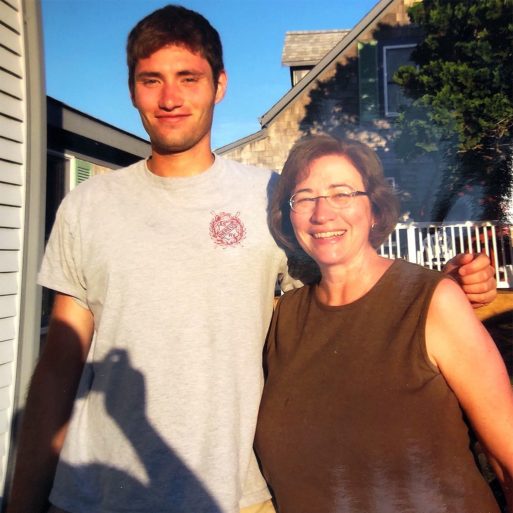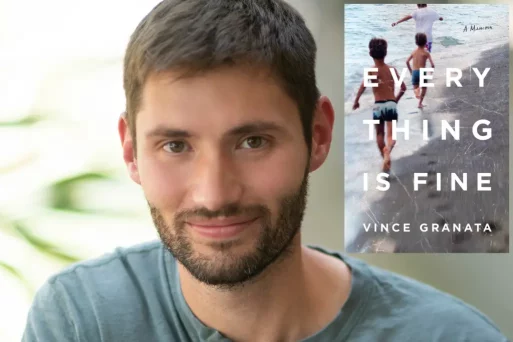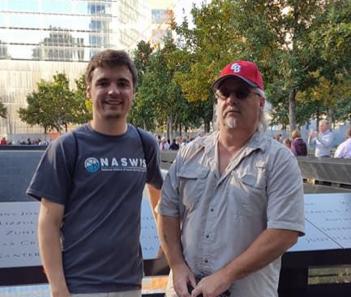
Vince with his mother, Dr. Claudia Granata, before her murder.
(10-18-22) Individuals with mental illnesses are more likely to be victims of crimes, rather than perpetrators. But a small percentage commit violent crimes and, what too often goes unnoticed, is that much of this violence is aimed at their own family members and caregivers.
A study published in the Clinical Social Work Journal noted that family violence has increased during the Covid crisis.
“Although most persons living with serious mental illness (SMI) do not act violently, this population is at a modestly increased risk of engaging in violence, with family members being the most common victims. Consequently, evidence suggests that a sizable minority of family members—many of whom are caregivers—have experienced violence by their relative with SMI. The risk of conflict and violence in families of persons with SMI is likely currently heightened due to a range of challenges resulting from the COVID-19 pandemic (e.g., interruption in treatment services and the occurrence of arguments while sheltering in place together).”
Two men whose lives were dramatically changed by family violence recently contacted me. Though their friendship may seem unlikely (because they come from different vantage points), they are now speaking out to help others and to push for treatment before tragedy.
Mother Is Murdered
“My family’s story is a tragic one,” Vince Granata told me in an email. “My little brother, Tim, began struggling with schizophrenia. At nineteen, away from home at college, his world transformed. He became convinced that his landlord was poisoning his food, that one of his classmates wore a necklace that was a demonic amulet, that shadows chased him across campus. Over the next three years, Tim struggled to find support and received only intermittent help from his college’s counseling services. Eventually, he returned home to our mother’s care.”
According to an Orange County, Conn., police report, authorities received a 911 call at 2:20 p.m on Thursday, July 24, 2014, from a man who said he’d just committed a murder, Emergency responders found Tim’s mother, Dr. Claudia Granata inside the family home. Police found Tim walking nearby, carrying a cell phone in his left hand and a Bible in his right. “I killed her. I stabbed her,” the police quoted him as saying when they arrested him.
He’d bound his mother’s wrists with duct tape in the family room of their house and had used two serrated knives and two sledgehammers to murder her. Police later discovered that earlier that morning, Tim had warned his mom that devils in his head had told him “something bad is going to happen. They are going to come for me. If something looks like a suicide, just know that I love you.”
A panel of judges found Tim not guilty by reason of a mental defect and sentenced him to 60 years in a state mental hospital. He was 22 years old and had been diagnosed with symptoms of schizoaffective disorder depressive type, with anxiety.
When his brother, Vince, learned of his mother’s murder, he was a 27 year-old Yale graduate teaching children in the Dominican Republic how to read. In his email to me, Vince wrote:
“In the years that followed, I struggled to maintain a relationship with him, to find a way to remain his brother. Since 2015, Tim has lived in a forensic hospital, a locked ward where he will spend his foreseeable future. During those years, he’s been in treatment, has learned to accept his illness, has voluntarily taken medication, and participated in his care. We’ve found a way back to each other. Now, though he struggles immensely in the aftermath of our mother’s death, he’s a patient and caring man. I’m grateful for his progress and for the relationship that we have, but it’s also painful to see how he’s responded to consistent treatment, care he didn’t receive before our mother’s death. I’m reminded every time I speak with him that none of this had to happen. He could have lived a peaceful life.
None Of This Had To Happen
An English teacher and award winning writer, Vince decided to write about his brother and the family’s attempts to help Tim. Both of their parents were well-educated emergency room doctors with financial resources.
“For me, writing has always provided a way to order my thoughts, to make sense of chaos, to impose some control on stories that seem completely out of control. While my family’s story isn’t one that can be neatly explained or wrapped up in a simple story, I do believe that writing my book has shed some light on the challenges Tim faced, challenges that are all too familiar for many people who have loved ones living with serious mental illness.”
Vince’s book, Everything Is Fine, was published in April of last year. In a New York Times book review, Lisa Miller wrote:
In the Granata home, things had not been fine for a very long time. Both parents were trained as emergency room doctors, but even they were stymied — trapped — by the horror-show suite of nonchoices schizophrenia presents. Sufferers can’t perceive how sick they are, nor can they be hospitalized against their will, unless they present a danger to themselves or others. So many don’t seek help, and absent a trip to the E.R. or a 911 call, loved ones
Vince Granata writes about family’s tragedy
have no way to obtain it for them. Tim’s brutality was unusual, but otherwise his illness ran a typical course. He had threatened suicide a number of times, leading to a brief hospital stay. Medication seemed to stabilize him, but when he was sent home he flushed the pills down the toilet.
Everyone of us with a family member who has a serious mental illness are painfully aware of the multiple hurdles that prevent individuals from getting meaningful mental health treatment in our nation – roadblocks that the set the stage for arrests, violence and deaths. Vince’s well-crafted book was yet another call to action.
A Reader Contacts Vince: I Could Have Been Your Brother
Not long after publishing Everything Is Fine, Vince was contacted by Cohen Miles-Rath. In an email to me, Cohen explained that he’d contacted Vince after reading his book.
“I experienced my first episodes of psychosis before my college graduation in 2016—less than two years after the tragic experience with Vince, Tim, and their family. I became convinced that I discovered the truth of everything. I came to believe an ex-girlfriend was going to marry me out of the blue. I saw patterns and signs, and was led on a ‘mission’ entirely made up in my head. Much like Tim, psychosis sent me down a terrifying path. After failed interventions and treatments, my illness became worse.”
In April 2016, police were called to the Rath home in Steuben County, New York, after the then 22-year old was spotted leaving out a side door with blood on his hands. State police determined that Cohen had attacked his father, Randy Rath, age 53, with a kitchen knife. After a struggle, the older Rath was able to disarm his son.
“I eventually tried to kill my dad as I believed the devil was him. Unlike Vince’s story, I survived. My dad fought me off and he survived. We became a miracle. A slim chance—the blade I held failed to puncture all because his thumb was wedged against his neck. Thankfully, he prevented my illness from taking both our lives.”
The felony charges against Cohen were reduced to misdemeanors and he accepted that he was ill and agreed to get help.
“When I was discharged from the hospital the first time (about a month before the incident), I was only concerned about getting back to school and graduating. I did not accept the illness. My family’s response was similar, hushing my illness away as if it made it disappear. I attended one therapy meeting after the hospital and it made me resent treatment. Why? Because we have not cared enough about mental health as a society. Mental health care is only effective when prevention, intervention, and crisis response meets the standard needed to appropriately support everyone and, sometimes, save lives. That is the premise of what we need to change. And this is not new.
Cohen Joins Vince In Calling For Reforms
Vince and Cohen began talking. Both were determined to end the silence that often is found in families ashamed that a loved one is mentally ill and violent. Cohen wrote in an email to me:
I am now twenty-eight years old and I get to live my life without a tragedy hanging over my head. However, the incident with my dad has stuck with me. It is why I pursued a Masters in Social Work. It is why I strive to be a leader in mental health advocacy. It is why I have reached out to Vince and also Tim in the hospital.
As Vince said, his situation did not have to happen. My situation did not have to happen either. Tim and I had been in some form of mental health intervention while in college. But why wasn’t it enough? What could have prevented our crises from resulting in such horrific means? From my work in mental health education and advocacy for the past three years, I have learned many potential answers to that question.
Cohen joined the National Alliance on Mental Illness, and wrote a NAMI blog about his experience. In his email to me, he called for colleges to do more to help students who are in crisis.
“For anyone who experiences an onset of mental illness symptoms, mental health has to take priority. Particularly for college students, academia should be put on the back burner until treatment has become effective. But too often, unaddressed or inadequately addressed mental health challenges drive students from higher education with no path to return. A 2012 NAMI survey concluded that 64% of students who experience mental health challenges wind up dropping out of school.
For treatment on campuses to be effective, it has to be readily available and encouraged. Any university policy with an inadequate response to a student’s leave of absence due to mental health can be revised to better meet student needs. Additionally, measures that encourage campuses to promote mental health will help address the rising need for support. In their work investigating mental health in New York colleges and universities, the Mental Health Association of New York State, Inc. identified that the percentage of students diagnosed with a mental health condition increased from 21.9% in 2007 to 35.5% in 2017.
Colleges can increase efforts to promote mental health in numerous ways. Mental health trainings for university staff will prevent fewer struggling students from slipping between the cracks. Providing mental health instruction for students can help reduce stigma that may prevent students from seeking support when needed. And elevating clinical services and peer support programs will increase opportunities for students to access needed support.
Like his fellow advocate, Cohen hopes to write a memoir.
“Keep an eye out for my name. Someday soon, I hope to publish my memoir which gives a full picture of my story.”
Whenever someone with a serious mental illness commits a violent crime, many mental health organizations keep quiet. They fear that responding to such stories acknowledges that individuals with untreated serious mental illnesses can be dangerous and further prejudices and stigmatizes those who are ill. (An exception has been the Treatment Advocacy Center.)
I believe news stories about serious mental illnesses and violence should be acknowledged and put into context. They should be used to explain to the public how difficult it is to get meaningful care, in part, because of our legal system and a dreadful lack of services. These incidents – that could have been prevented – cost lives and destroy families.
As Vince wrote: None of This Needed To Happen.
More About Vince and Cohen:
Vince Granata is a writer from New Haven, Connecticut. He is the author of the memoir, Everything Is Fine. His writing has recently appeared in Rolling Stone, Fourth Genre, The Massachusetts Review, Creative Nonfiction, and LitHub, and has been recognized in Best American Essays 2018 and Best American Essays 2020. He is currently a Ph.D. candidate in creative writing at the University of North Texas.
Cohen Miles-Rath is a Mental Health Peer, Advocate, and Social Work Professional. Since his experience of mental illness (schizoaffective), he shares his story to make positive changes in mental health and is in the process of writing a memoir. Running, music, and philosophy are among his favorite hobbies to maintain mind-body health. He is currently the Production Manager at the Mental Health Association in New York State where he works to end the stigma against mental illness and promote mental health wellness.





